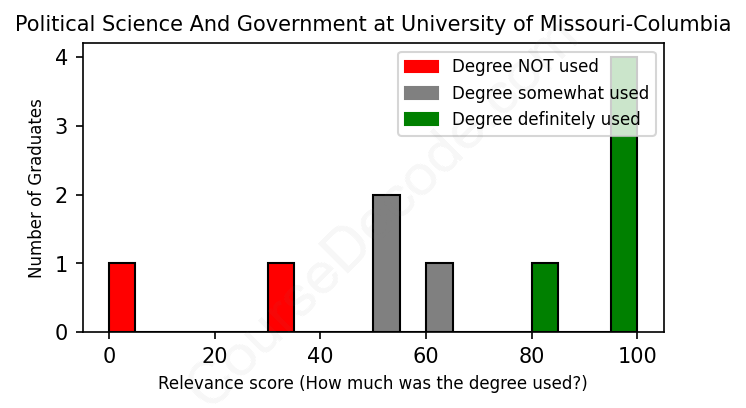
First, some facts. Of the Political Science And Government graduates from University of Missouri-Columbia we've analyzed , here's how many have used (or NOT used) their degree in their career:

These are estimates based on AI analysis of 10 LinkedIn profiles (see below).
The verdict? On par with the average. Overall, with an average relevance score of 67%, Political Science And Government graduates from University of Missouri-Columbia have about the same likelihood of finding work in this field as the average graduate across all fields:
And for comparison, here's the chart for all profiles we've looked at across all degrees.
Also, after graduating, 40% of these graduates have pursued further education other than another Bachelor's degree (such as a Masters degree or other), compared to the average across all profiles of 35%. This suggests you may need more than just a Bachelors degree to be competitive as a Political Science And Government graduate.
See the details:
|
Relevance score: 30% We think this person has NOT gone into a career related to their degree. We think this person has NOT gone into a career related to their degree.
DEGREE INFOGraduated in 2020 from University of Missouri-Columbia with a Bachelor of Arts - BA in Political Science And Government. No other secondary education since. JOB HISTORY SINCE GRADUATIONSPO Transportation United States Army Mar 2021 - Oct 2021 Maintenance Control Officer  United States Army Oct 2021 - Jul 2022 Company Executive Officer  United States Army Jul 2022 - Mar 2023 Battalion S4  United States Army Mar 2023 - Present ABOUTNo information provided. |
The top 10 most common jobs done by the graduates we've analyzed (ranked most common to least) are:
From the analysis of LinkedIn profiles of graduates from the University of Missouri-Columbia with a degree in Political Science and Government, a pretty clear trend emerges: many of these individuals have gravitated towards jobs that intermingle with the political landscape, particularly in roles related to government operations, legal work, and project management. Positions like Analyst and Internal Auditor at various city offices, and roles such as Field Representative and Congressional Intern are solid examples where the expertise from their degree is put to use. These jobs often demand an understanding of political processes, governance, and compliance with regulations, which are fundamental topics covered in their studies. It seems like many students have found relevant pathways, especially within public service, law, or management in politically charged environments.
However, not all jobs align closely with what a Political Science and Government degree entails. There are quite a few instances of graduates taking up roles in the private sector—like Senior Transaction Coordinator or even positions related to food service management—where the day-to-day responsibilities don't actively engage with political concepts or theories. While some of these roles, like being a manager or a coordinator, might utilize skills like negotiation and leadership, they often lack the direct application of political science knowledge. So, in summary, while there are definitely common and relevant career paths linked to this degree, there’s also a noticeable chunk of graduates finding themselves in jobs that are somewhat disconnected from their academic training. It really shows how varied career choices can be after college, regardless of one’s major.
Here is a visual representation of the most common words in job titles for Political Science And Government graduates (this is across all Political Science And Government graduates we've analyzed, not just those who went to University of Missouri-Columbia):

Graduates from the University of Missouri-Columbia with degrees in Political Science and Government seem to have taken several distinct career paths after finishing their studies. Many of them land their first roles in public service, internships, or administrative positions that align closely with their degree. For example, graduates have secured positions as analysts, public relations interns, and even legal clerks. This initial entry into the workforce demonstrates a solid connection to political and governmental roles, which is promising for aspiring political science students.
Fast forward a few years, and you'll notice some interesting trends. Graduates often ascend within government-related jobs, like moving from administrative roles to analyst or managerial positions within city governments. Others pivot into legal careers or establish themselves in public relations and operations roles. However, there are also a few that have ventured far from the expected political science trajectory, ending up in unrelated industries like hospitality or retail management. Overall, many graduates appear to be doing well and progressively building careers relevant to their studies, but there is also a level of unpredictability, as some find themselves in less relevant fields as time goes on. So, while there are some strong success stories, not everyone is following a linear path towards a political science-related career.
Honestly, a Bachelor’s degree in Political Science and Government at the University of Missouri-Columbia isn't the easiest thing in the world, but it’s not the hardest either. It involves a good bit of reading, writing, and understanding complex theories and systems, so you definitely need to be prepared for some heavy coursework and engaging discussions. If you’re passionate about topics like politics, policy, and international relations, you might find the material really interesting, which can make it a lot easier to tackle. Just be ready to put in the effort—like good time management, attending lectures, and keeping up with your readings will be key. Overall, it’s pretty manageable if you stay organized and motivated!
Most commonly, in the LinkedIn profiles we've looked at, it takes people 4 years to finish a Bachelor degree in Political Science And Government.
Looking at the careers of these University of Missouri-Columbia grads, it seems like a mixed bag when it comes to making decent money. The earlier graduates, especially the one in the real estate sector, seem to have climbed the ladder pretty quickly at Cushman & Wakefield, hinting at a solid paycheck. Meanwhile, the ones sticking with roles in government, like the City of Kansas City gigs, might not be raking in the big bucks, especially in their earlier positions. Those in legal professions seem to have a promising trajectory, but it takes time to reach higher salary levels. Overall, some are likely doing well, but others are probably on the slower path to solid financial success.
Here is a visual representation of the most common words seen in the "about" section of LinkedIn profiles who have a Bachelor degree in Political Science And Government (this is across all Political Science And Government graduates we've analyzed, not just those who went to University of Missouri-Columbia). This may or may not be useful:

Here are all colleges offering a Bachelor degree in Political Science And Government (ordered by the average relevance score of their Political Science And Government graduates, best to worst) where we have analyzed at least 10 of their graduates: